- Homepage
- Our green garden
- Invasive Alien Species
Invasive alien species
Invasive alien species may have many benefits as well as a negative impact on the environment.
These animals and plants in their home environment where there are natural predators to keep them in balance may become destructive when moved to other parts of the world.
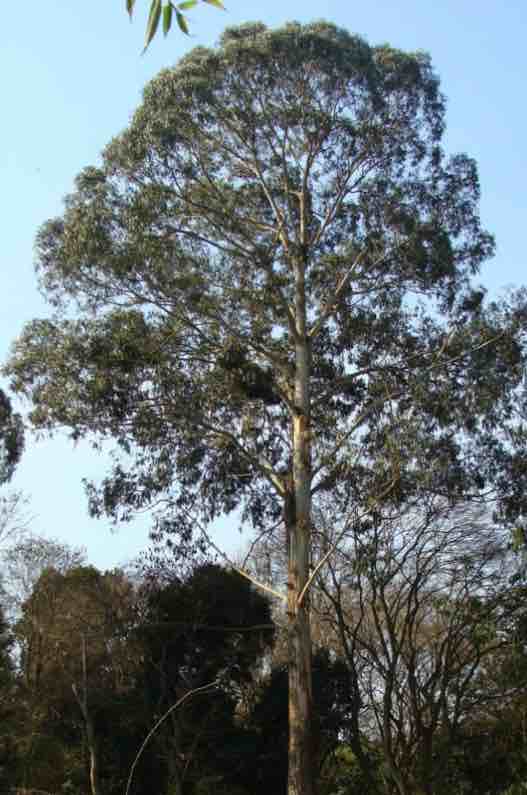
This page was last updated by Bernard Preston on 7th May, 2023.
Some have been introduced deliberately like the rabbit in Australia and others inadvertently like the bugweed in South Africa; both have had an extremely negative effect on the ecology of their new environments.
Others like the cherry guava may bring huge benefits when grown in cool climates at altitude but taken to sea level as in Hawaii have become very destructive.
In short many alien species have brought enormous benefits and carte blanche removal by authorities makes neither economic nor environmental sense.
Two of the world's greatest invasive aliens are the black and brown rats, carriers of the Bubonic plague flea; and the common domesticated cat.
Whilst the rats bring no known benefits, there would be outrage if authorities decided to eradicate the cat because it consumes six billion tons of fish from our oceans; not its normal diet.
Dialogue and debate must continue; should the cat be completely eradicated, or simply controlled and how should that best be done?
Is there a place for the gum and wattle tree considering the raw materials they provide for industry? Is the jacaranda tree in Pretoria and Pietermaritzburg, South Africa, acceptable but quite the contrary in the Lowveld?
Invasive alien species
Invasive alien species should not give authorities unlimited discretionary power to prohibit them all; and order their eradication.
Beneficial alien species may be divided up into those that provide:
- Food for both humans and other animal species.
- Raw materials for industry.
- Ornamental plants.
- Those like the trout that provide both food and recreation.
In South Africa there are literally hundreds of listed invasive alien species but clearly some are far more damaging than others.
Lantana for example has become an extremely invasive and debilitating weed in many parts of the world including South Africa. The Wandering Jew, Tradescantia zebrina, likewise is highly detrimental but its negative effects are more of nuisance value; and some would argue it has considerable benefits as a ground cover for which it was imported and as a composting material.
Given the limited resources to control these plants, attention should rather be given to the Lantana.
The material expressed on this page is gleaned from the nutritional and environmental literature; it is clearly referenced. A plain distinction is made between the author's opinion and that which is scientifically proven. When in doubt consult your health professional.
To suggest a correction or clarification, write to Dr Bernard Preston here. Contact.
Invasive alien species may be divided up into several categories.
- Those that are extremely destructive to the environment; they make up about a third of the list, having a highly negative impact without providing any benefits to either the environment or society.
- Others are beneficial bringing clear benefits without any significant downside. They make up about a tenth of the list of invasive plants and animals. Examples would be the Cape gooseberry, and Fetida used in worm farms.
- Some are of little consequence either way; they make up more than a half of the list. The much loved jacaranda tree would be an example.
- Several are controversial, bringing some benefits but in the eyes of many environmentalists also have a destructive side; this group makes up less than 10% of the list. The blue gum tree would be an example, providing much timber to industry, nectar and pollen to hard pressed honeybees but draw a lot of water from the thirsty land. The trout would be another, bringing recreation and food to many sportsmen but having a negative effect on indigenous species of fish.
Newsletter
Our newsletter is entitled "create a cyan zone" at your home, preserving both yourself and Mother Earth for future generations; and the family too, of course. We promise not to spam you with daily emails promoting various products. You may get an occasional nudge to buy one of my books.
Here are the back issues.
- Lifestyle and ideal body weight
- What are ultra-processed foods?
- Investing in long-term health
- Diseases from plastic exposure
- Intensive lifestyle management for obesity has limited value
- A world largely devoid of Parkinson's Disease
- The impact of friendly bacteria in the tum on the prevention of cancer
- There's a hole in the bucket
- Everyone is talking about weight loss drugs
- Pull the sweet tooth
- If you suffer from heartburn plant a susu
- Refined maize meal and stunting
- Should agriculture and industry get priority for water and electricity?
- Nature is calling
- Mill your own flour
- Bake your own sourdough bread
- Microplastics from our water
- Alternative types of water storage
- Wear your clothes out
- Comfort foods
- Create a bee-friendly environment
- Go to bed slightly hungry
- Keep bees
- Blue zone folk are religious
- Reduce plastic waste
- Family is important
- What can go in compost?
- Grow broad beans for longevity
- Harvest and store sunshine
- Blue zone exercise
- Harvest and store your rainwater
- Create a cyan zone at your home
There are others not on the list that might be added. For example, our chickens will systematically remove every single earthworm from the soil given the chance but simultaneously provide protection against serious pests.
In our own backyard we wrestle with the benefits of fruit trees like the mulberry and cherry guava that are certainly listed amongst the invasive alien species in many parts of the world; but provide food for both us and many species of indigenous birds and forage for our bees.
This also creates tensions as under the biodiversity act plans to control and manage them are compulsory; in theory at least we could be prosecuted for growing them and giving plants to friends and neighbours.
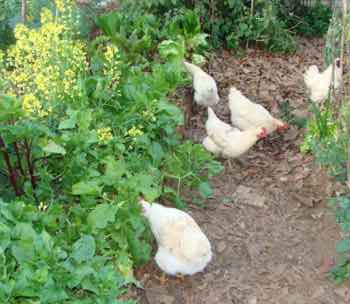
These chickens in the garden will remove pests but the very friendly earthworms too.
To keep the balance we indulge in the wonder of worm farms where we breed Fetida by the million, literally, to feed to the hens; the birds are kept from some of the compost heaps where they proliferate.
Worm farms also provide liquid manure and compost for our veggies; it is all about balance in the backyard permaculture.
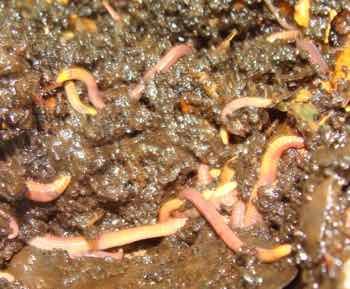
Another invasive alien that will provide raw materials that can be used is the bamboo. It spreads very slowly but once established is extremely difficult to remove. We find many uses in the garden for bamboo, not least this vegetable garden trellis; it is so useful for growing plants like climbing beans that need support.
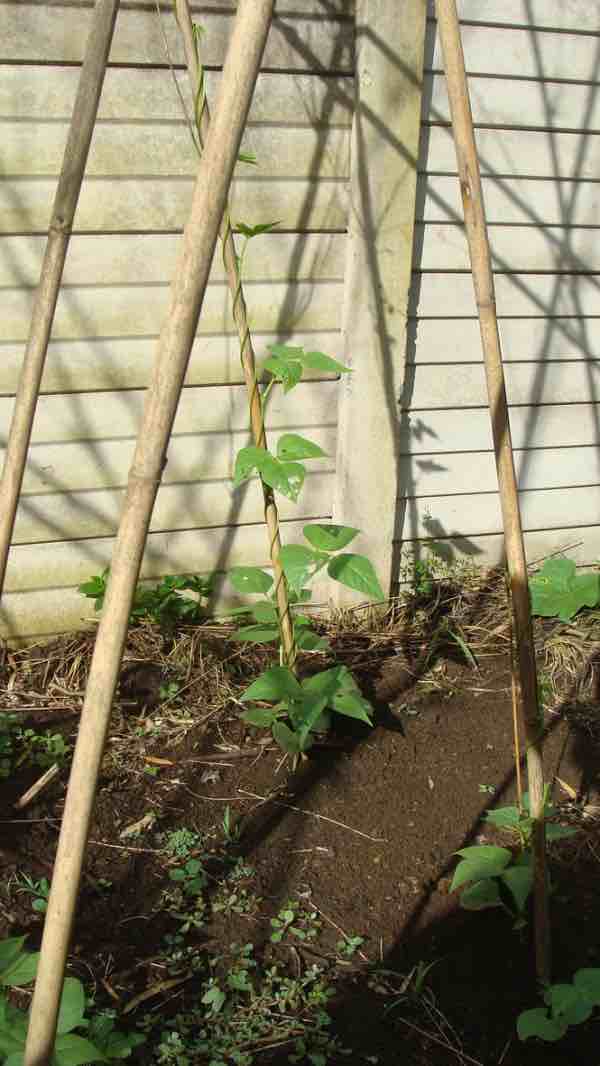
Regional aliens
Personally I advocate listing plants and animals according to whether they are regional invasive alien species. The cherry guava may be highly destructive at sea level but their invasive nature in cooler climes is negated; and their benefits come to the fore. Obviously there are tensions and fierce disagreements making consensus difficult.
Focus needs to be on those invasive alien species where there is no disagreement; they must go. There are more than enough of them to keep environmentalists busy without fussing over the trout, the domestic cat and the mulberry tree.
The cherry guava is extremely invasive in hot humid climates at sea level, but not at all at 4000' asl where we live.
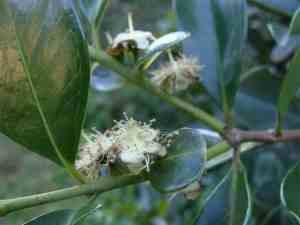
This cape gooseberry jam recipe is definitely one of our favourites placing the fruit into the beneficial group of regional aliens with minimal negative connotations.
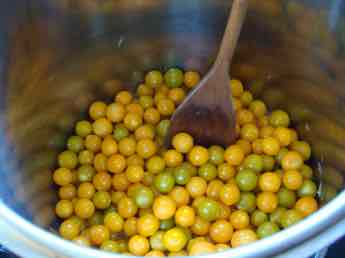
Mulberries[2] are another alien that is taboo in the minds of hard-line greenies. But the plant belongs to the power of purple foods, rich in healthy phenolic compounds like resveratrol[3] and making divine condiments.
How to make mulberry jam[4] is high on the good wife's agenda, early every summer. Many bird species not usually seen in our garden arrive to feed on the harvest also.
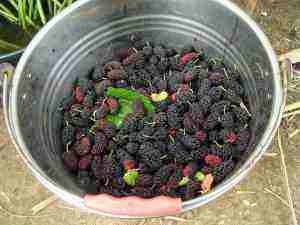
With thanks to Jeremiah Ondonga Asaka for many of the concepts expressed in this blog.
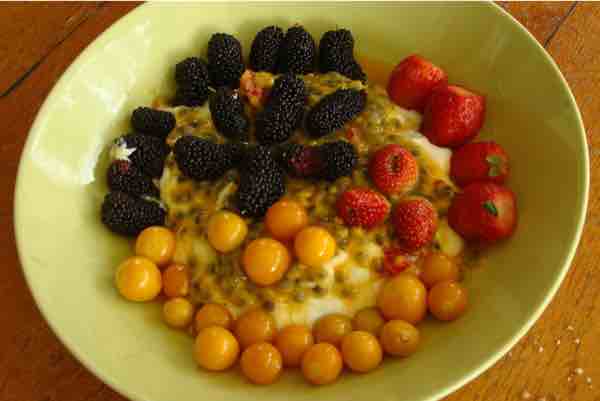
Breakfast does not get better than this; four of our seven to ten mandatory coloured foods already under the belt, the taste without equal. No sugar or honey is needed.
Just publishing this picture and advocating these invasive aliens could get me arrested!
Yes life is full of compromises, and what we grow and eat is no different. Incidentally the bees love all four of these useful invasive alien species.
Would you like to add your pennyworth? By all means use contact to discuss these issues.
- Return from invasive alien species to backyard permaculture.
- Common mulberry morus alba
- Three reasons to eat raw mulberries
- How to make mulberry jam. Web: https://tinyurl.com/5dmesmjp
When browsing use right click and Open Link in New Tab, or you may get a bad gateway signal.
Did you find this page interesting? How about forwarding it to a friendly book or food junkie? Better still, a social media tick would help.
- Homepage
- Our green garden
- Invasive Alien Species
Address:
56 Groenekloof Rd,
Hilton, KZN
South Africa
Website:
https://www.bernard-preston.com